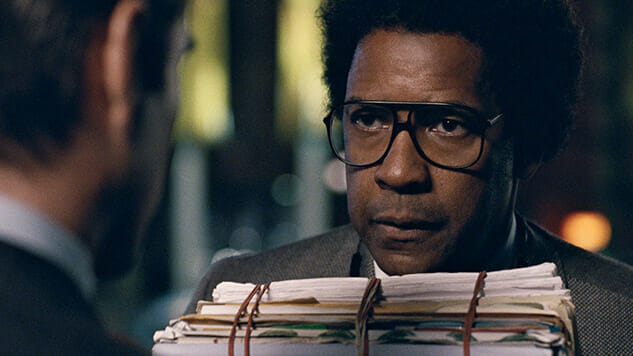Roman J. Israel, Esq.

You can install a gap between Denzel Washington’s two front teeth. You can dress him in baggy suits that make Donald Trump’s wardrobe look well-proportioned. You can pretend he’s pear-shaped, require he speak in vocal-fried monotone, demand he deny his costars eye contact—and if you do all of this, he’ll still be Denzel Washington, always and forever. The proof is in his latest, Roman J. Israel, Esq., the new film from writer-director Dan Gilroy, last meaningfully heard from in his 2014 directorial debut, Nightcrawler.
Considerably less time has passed since we last heard from Washington, who released his third effort as director, Fences, around this time in 2016. The post-Fences path that led him through Hollywood into Gilroy’s employ must have been serpentine, though it isn’t hard to imagine Washington finding the appeal in making the leap from August Wilson to Lou Bloom. Nightcrawler is the same circus amorality Denzel has gravitated towards, off and on, since Training Day, and while their specifics vary, you can spot the family resemblance if you squint: They’re both set in the sweaty, abandoned world of Los Angeles, they both fixate on men lacking in scruples and they both hinge on reinvention of their leading men.
Think of Roman J. Israel, Esq. as a bridge joining Nightcrawler and Training Day, without much of the edge of either. A Gilroy movie should fall well within Washington’s wheelhouse, and Roman J. Israel, Esq. suits him, but one senses the film may’ve lost its teeth somewhere in the transition from page to screen. Like Nightcrawler’s, its protagonist is a relentless advocate, but unlike Nightcrawler’s, the title character in Roman J. Israel, Esq. advocates for others and not for himself, at least in the beginning. The film emphasizes a social consciousness that Nightcrawler necessarily ignores, understanding that people in bad legal circumstances are there in part because of the choices they make, but also because they have limited choices to make in the first place. “Each of us,” Roman opines at one point, “is greater than the worst thing we’ve ever done.”
Roman’s choices are similarly narrow. He’s also greater than the worst thing he does in the film, which admittedly is pretty bad. Roman is the proverbial man behind the curtain at his law firm, a two-man outfit focused on civil rights litigation. When his partner, former law professor William Henry Jackson, has a sudden stroke, Roman is forced, for the first time in decades, to leave the comfort of his office, where he spends his days corralled in by towering stacks of paperwork, and set foot in front of a judge. He isn’t much for social interaction, though, and no sooner does he step out than he is hit with a hefty fine for contempt. Things go downhill from there: George Pierce (Colin Farrell), Jackson’s old student turned hotshot lawyer, is brought aboard to help shutter their firm, leaving Roman without a paycheck and without a sense of personal identity.
-

-

-

-

-

-

-

-

-

-

-

-

-

-

-

-

-

-

-

-

-

-

-

-

-

-

-

-

-

-

-

-

-

-

-

-

-

-

-

-








































